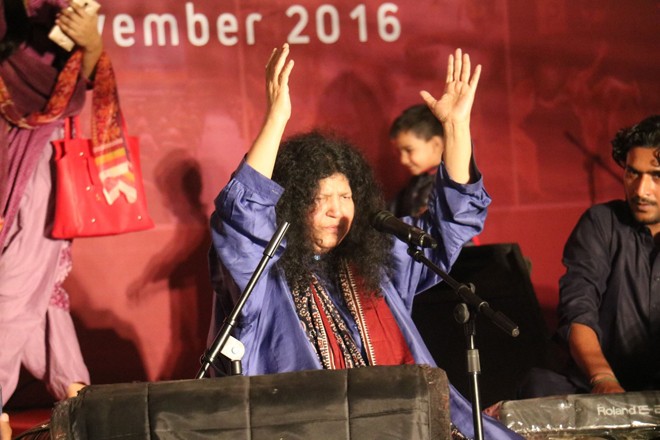
Spanning over three days, Sindh’s first literature festival held in Karachi highlighted the role of regional and vernacular languages as vehicles of thought, culture and identity

A calligraphic depiction of Sindh’s Sufi mystic and poet Shah Abdul Latif Bhittai’s poetry titled ‘Alif’ by artist Sanki stood out among a collection of art exhibits depicting Sindh’s culture and literature. Rarely has Karachi seen so many Sindhi language books in one place as were on display here -- Shaikh Ayaz’s work lying on the same table as Tajal Bewas’ collection of poetry -- depicting Sindh’s eclectic culture.
Panelists were seen animatedly discussing hardcore literary subjects. Encouragingly enough, the first Sindh Literature Festival 2016 (SLF), recently held in Karachi, was more about actual literary concerns and less about populist frolic and festivity. While Abida Parveen’s Sufi poetry renditions remained the highlight on the inaugural day, it was her homage to the pluralistic and culturally rich Sindh region that shone out, as she sung out the words "Sindh munhji amma…" (Sindh, my mother….).
Spanning over three days, SLF, the first event of its kind, more than anything else, brought to the fore the importance of regional and vernacular languages as vehicles of thought, culture and identity. The narrative coming out of it reminded one of the fact that regional languages and cultures serve as much as agents of unification as do national languages. This may be particularly true because the language in question is Sindhi. This historical Indo-Aryan language borrows the Arabic script with elements of Perso-Arabic, with a large alphabetical body consisting of 16 vowels and 46 consonants. It is quite symbolic how fluid the letters of the Sindhi alphabet are merged to form new ones: The sound of "b" can become "bh" without adding an "h" -- all you need to do is add three additional dots to it. Such is the eclectic nature of the language, as is Sindh’s culture.
SLF saw a decent, if not a large, turn out of people. The intelligentsia, literati and media persons of the region visited the event. Diplomats and dignitaries attended it, as did influential thought leaders and members of the civil society. SLF patron Abdullah Hussain Haroon, Minister for Culture Syed Sardar Ali Shah, and United States Consul General Grace W. Shelton were seen prominently. But the real stars were the unsung non-celebrity poets, writers and artisans of Sindh who got a chance to bring their work into the mainstream through this platform, showcasing the granular details of Sindh’s culture.
A particularly interesting session was a dialogue regarding the book, Hassan Dars jo Risalo. Hassan Dars, one of Sindhi language’s most contemporary poets and writers, left much unsaid with his untimely death in 2011. His book, Hassan Dars jo Risalo was launched after his passing. "His work is a depiction of Sindh’s historical and cultural heritage. His work has the essence of the spring of Sindh. He is a continuum of Ayaz and Bhittai but he is not a copy paste version; he retains his unique individual style and remains himself," said Taj Joyo, paying rich tributes to Dars. Joyo is a renowned and seasoned Sindhi writer known for his progressivism.
An interesting discussion on how to include new scientific research words in Sindhi language saw educationist and scholar Dr Sulaiman Shaikh talk about the challenges of a growing Sindhi vocabulary and lexicon in a changing world. "Science started from the word why and if people owning different cultures and languages start asking the correct questions, the answers will automatically result in enhancing the vocabulary of languages, whether national or vernacular."
A question was raised in the session that if Sindhi researchers follow the example of others and do research in their own language, or in an international language. The moderator gave the example of the word used for the word ‘telescope’.
"Even in Sindhi we call it a door-been which is actually an Urdu word. If we use the Sindhi word for it, it would be door-dissnri. Will that be too heavy a word?" she asked.
Expressing her delight, and calling the SLF an occasion to showcase pride in the literary heritage of Sindh, journalist and Sindhi literature enthusiast, Aqsa Junejo said that Sindh Culture Day is a good initiative but has gotten limited to just dancing on Sindhi music and wearing the Sindhi Topi (cap) and Ajrak.
"At SLF, along with Sindh’s rich history, literature, art and poetry being discussed, we have also seen a focus on socio-political changes in Sindh. Conversations on how to cope with issues the language is facing, the education system and the need for an emergency education plan have been the highlights," said Junejo. However, Junejo suggested that engagement of more writers and historians who have worked in Sindh, for Sindh, or have written about Sindh, will need to be added to the SLF agenda in upcoming years.
The SLF has the potential to serve as a catalyst to further promotion and celebration of Pakistan’s many regional and vernacular languages. This may give us back what rapid urbanisation is taking away.